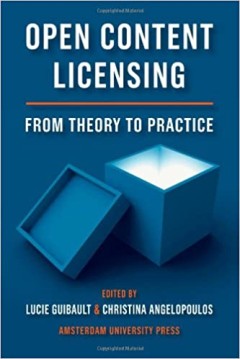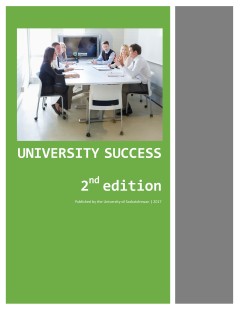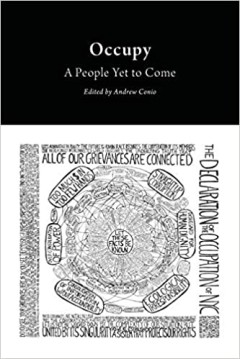Filter by

Introduction to Curriculum for Early Childhood Education : An Open Educationa…
In the early twentieth century, scientists and theorists—such as Jean Piaget and Lev Vygotsky— developed widely studied theories to explain how young children acquire knowledge. Scientists have continued to study children’s ways of knowing by care- fully observing and listening as children pursue new skills, explore materials, solve problems, work together with others, and encounter e…
- Edition
- -
- ISBN/ISSN
- -
- Collation
- -
- Series Title
- -
- Call Number
- 372 PAR i

Ecotribology : research developments
This book presents resent research advances in the area of eco-triobology. In the last years, eco-tribology or environmentally friendly tribology has gained increasing importance in sustainable engineering. Environmentally acceptable tribological practices save resources by optimizing product usage and reducing energy. This book covers current developments in all areas covered by the term eco-t…
- Edition
- -
- ISBN/ISSN
- 9783319240077
- Collation
- vii, 174 pages
- Series Title
- -
- Call Number
- 333.791 6

Open Content Licensing : from Theory to Practice
Although open content licences only account for a fraction of all copyright licences currently in force in the copyright world, the mentality change initated by the open content movement is here to stay. To promote the use of open content licences, it is important to better understand the theoretical underpinnings of these licences, as well as to gain insight on the practical advantages and inc…
- Edition
- -
- ISBN/ISSN
- 978 90 4851 408 3
- Collation
- -
- Series Title
- -
- Call Number
- 348 OPE

Applicable Law in Investor–State Arbitration
This book examines the law, national and/or international, that arbitral tribunals apply on the merits to settle disputes between foreign investors and host states. In light of the freedom that the disputing parties and the arbitrators have when designating the applicable law, and because of the hybrid nature of legal relationship between investors and states, there is significant interplay bet…
- Edition
- -
- ISBN/ISSN
- 9780199656950
- Collation
- -
- Series Title
- -
- Call Number
- 348 KJO a

Federal Rules of Bankruptcy Procedure : As amended to January 2, 2014
The Bankruptcy Rules and Forms govern procedure in cases under title 11 of the United States Code. The rules shall be cited as the Federal Rules of Bankruptcy Procedure and the forms as the Official Bankruptcy Forms. These rules shall be construed to secure the just, speedy, and inexpensive determination of every case and proceeding. (As amended Mar. 30, 1987, eff. Aug. 1, 1987; Apr. 30, 1991, …
- Edition
- -
- ISBN/ISSN
- -
- Collation
- -
- Series Title
- -
- Call Number
- 348 FED

University Success
University Success has a student-friendly format arranged to help you develop the essential skills and provide the information you need to succeed in university. This is not a textbook full of theory and extensive detail that merely discusses student success; rather, this is a how-to manual for your first year of study. The book provides realistic, practical guidance ranging from study skills t…
- Edition
- -
- ISBN/ISSN
- -
- Collation
- -
- Series Title
- -
- Call Number
- 378 MAH u

Educating desire : autobiographical impressions of addiction in alcoholics an…
This impressionistic autobiographical inquiry is an attempt to connect the personal with the socio-historical--addiction with Addiction; it is also an attempt to demonstrate that knowledge production can be generated through radically non-traditional means. Narrative serves as method and methodology in a mostly first person account of a fictional open AA meeting. A suspicious hermeneutics is ap…
- Edition
- -
- ISBN/ISSN
- 9789463001458
- Collation
- xviii, 81 pages
- Series Title
- -
- Call Number
- 362.292 86

Occupy : A People Yet To Come
The term Occupy represents a belief in the transformation of the capitalist system through a new heterogenic world of protest and activism that cannot be conceived in terms of liberal democracy, parliamentary systems, class war or vanguard politics. These conceptualisations do not articulate where power is held, nor from where transformation may issue. This collection of essays by world-leading…
- Edition
- -
- ISBN/ISSN
- 9781785420047
- Collation
- -
- Series Title
- -
- Call Number
- 330.122 CON o

Educating generation next : young people, teachers and schooling in transition
Explores the challenges faced by young people in this environment as they transition from school to work and asks how well young people are prepared for the contemporary labour force during their school years. Is the current industrial model of schooling capable of preparing young people for working life of the 21st century?
- Edition
- -
- ISBN/ISSN
- 9781137526397
- Collation
- ix, 207 pages ; 23 cm
- Series Title
- -
- Call Number
- 370.113

Aging Well : Solutions to the Most Pressing Global Challenges of Aging
This open access book outlines the challenges of supporting the health and wellbeing of older adults around the world and offers examples of solutions designed by stakeholders, healthcare providers, and public, private and nonprofit organizations in the United States. The solutions presented address challenges including: providing person-centered long-term care, making palliative care accessibl…
- Edition
- -
- ISBN/ISSN
- 978-981-13-2164-1
- Collation
- XVII, 218 halaman
- Series Title
- -
- Call Number
- 362 GAL a
 Computer Science, Information & General Works
Computer Science, Information & General Works  Philosophy & Psychology
Philosophy & Psychology  Religion
Religion  Social Sciences
Social Sciences  Language
Language  Pure Science
Pure Science  Applied Sciences
Applied Sciences  Art & Recreation
Art & Recreation  Literature
Literature  History & Geography
History & Geography